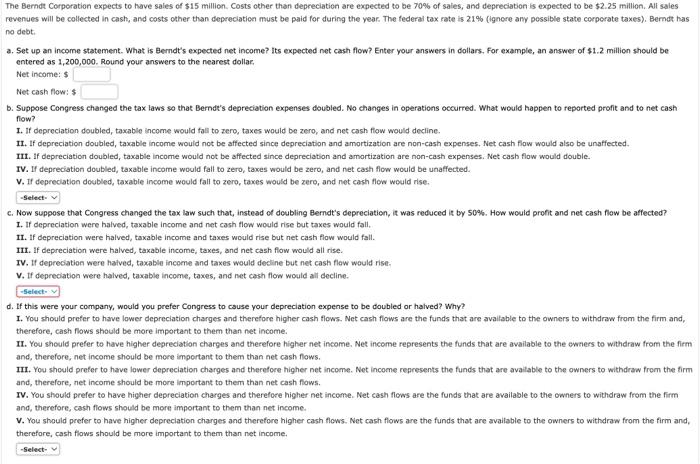The Berndt Corporation expects to have sales of $15 million. Costs other than depreciation are expected to be 70% of sales, and depreciation is expected to be $2.25 million. All sales revenues will be collected in cash, and costs other than depreciation must be paid for during the year. The federal tax rate is 21% (ignore any possible state corporate taxes). Berndt has no debt. a. Set up an income statement. What is Berndt's expected net income? Its expected net cash flow? Enter your answers in dollars. For example, an answer of $1.2 million should be entered as 1,200,000. Round your answers to the nearest dollar. Net income: $ Net cash flow: $ b. Suppose Congress changed the tax laws so that Berndt's depreciation expenses doubled. No changes in operations occurred. What would happen to reported profit and to net cash flow? I. If depreciation doubled, taxable income would fall to zero, taxes would be zero, and net cash flow would decline. II. If depreciation doubled, taxable income would not be affected since depreciation and amortization are non-cash expenses. Net cash flow would also be unaffected. III. If depreciation doubled, taxable income would not be affected since depreciation and amortization are non-cash expenses. Net cash flow would double. IV. If depreciation doubled, taxable income would fall to zero, taxes would be zero, and net cash flow would be unaffected. V. If depreciation doubled, taxable income would fall to zero, taxes would be zero, and net cash flow would rise. -Select- c. Now suppose that Congress changed the tax law such that, instead of doubling Berndt's depreciation, it was reduced it by 50%. How would profit and net cash flow be affected? 1. If depreciation were halved, taxable income and net cash flow would rise but taxes would fall. II. If depreciation were halved, taxable income and taxes would rise but net cash flow would fall. III. If depreciation were halved, taxable income, taxes, and net cash flow would all rise. IV. If depreciation were halved, taxable income and taxes would decline but net cash flow would rise. V. If depreciation were halved, taxable income, taxes, and net cash flow would all decline. -Select- d. If this were your company, would you prefer Congress to cause your depreciation expense to be doubled or halved? Why? I. You should prefer to have lower depreciation charges and therefore higher cash flows. Net cash flows are the funds that are available to the owners to withdraw from the firm and, therefore, cash flows should be more important to them than net income. II. You should prefer to have higher depreciation charges and therefore higher net income. Net income represents the funds that are available to the owners to withdraw from the firm and, therefore, net income should be more important to them than net cash flows. III. You should prefer to have lower depreciation charges and therefore higher net income. Net income represents the funds that are available to the owners to withdraw from the firm and, therefore, net income should be more important to them than net cash flows. IV. You should prefer to have higher depreciation charges and therefore higher net income. Net cash flows are the funds that are available to the owners to withdraw from the firm and, therefore, cash flows should be more important to them than net income. V. You should prefer to have higher depreciation charges and therefore higher cash flows. Net cash flows are the funds that are available to the owners to withdraw from the firm and, therefore, cash flows should be more important to them than net income. -Select







